Chicken Keeping In California
Want to start keeping chickens in California? There’s a lot to love about the Golden State, and we’ve compiled all the information you need to prepare for your chicken-keeping journey in California. Learn which chicken coops work best in California climates, what breeds of chickens are best suited for your region, and find an Omlet ambassador near you to chat about their Omlet chicken coop and products. Ready to start your chicken-keeping journey? Keep reading!
Page Contents:
Which chicken coop is best for California?
Speak to an Omlet chicken keeper in California
Chicken keeping Facebook groups in California
Protecting your flock from California weather
Chicken breeds suited to California weather
Common chicken predators in California
Do I need planning permission for my California Chicken Coop?
Which chicken coop is best for California?
Choosing the perfect chicken coop for your California flock can make your chicken-keeping experience fun and convenient with your lifestyle. You should also consider if you want to move your chicken coop around your backyard. If you do, consider getting a chicken coop with wheels. Be sure to research local laws and zoning requirements where you live, so you can determine how many chickens you can have and what size chicken coop you’ll need.
Eglu Cube Chicken Tractor
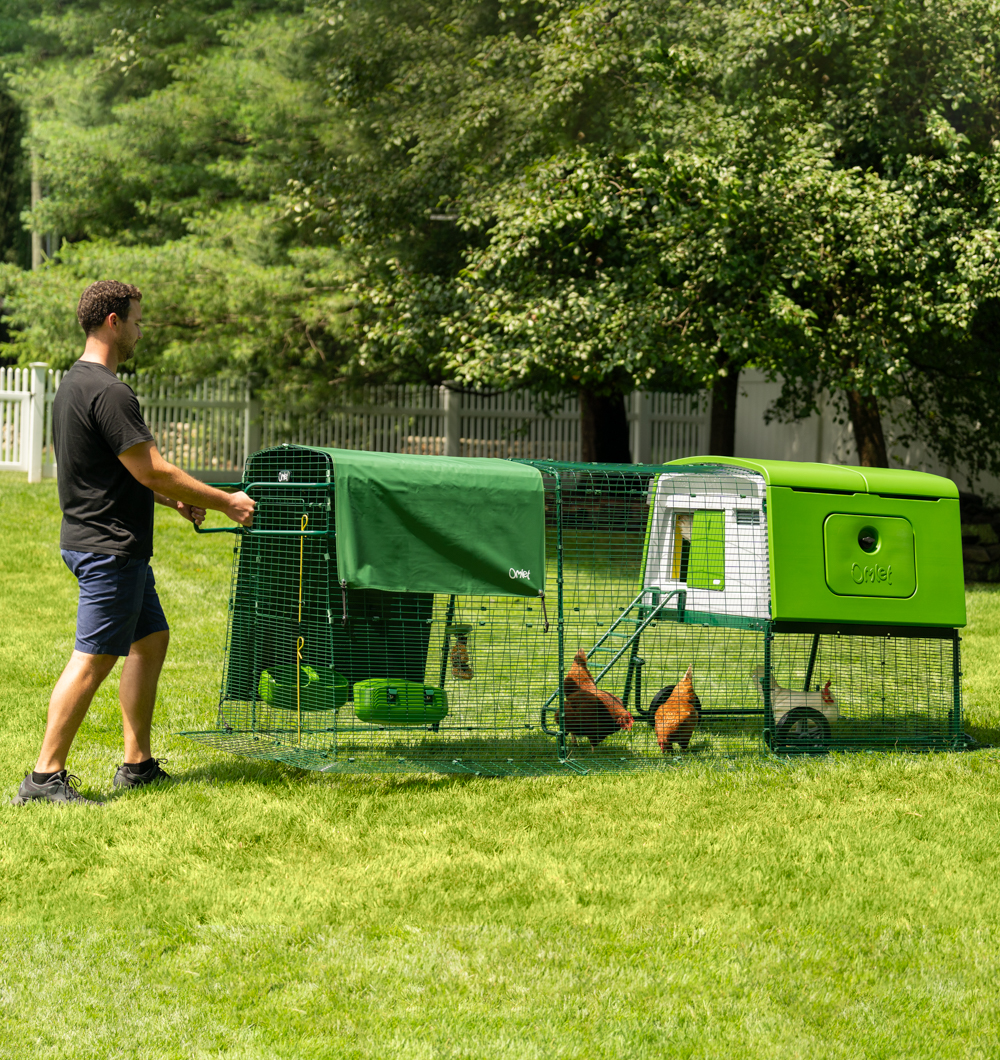
Omlet's easy to move Eglu Cube chicken coop.
Eglu Cube Chicken Tractor
The Eglu Cube Chicken Tractor is the best coop to suit the Californian climate. The twin-wall insulation means your flock can stay cool all summer long and with extra protection from the Sunny Eglu Cube Weather Pack your hens can stay safe in the shade.
Eglu Go Chicken Coop
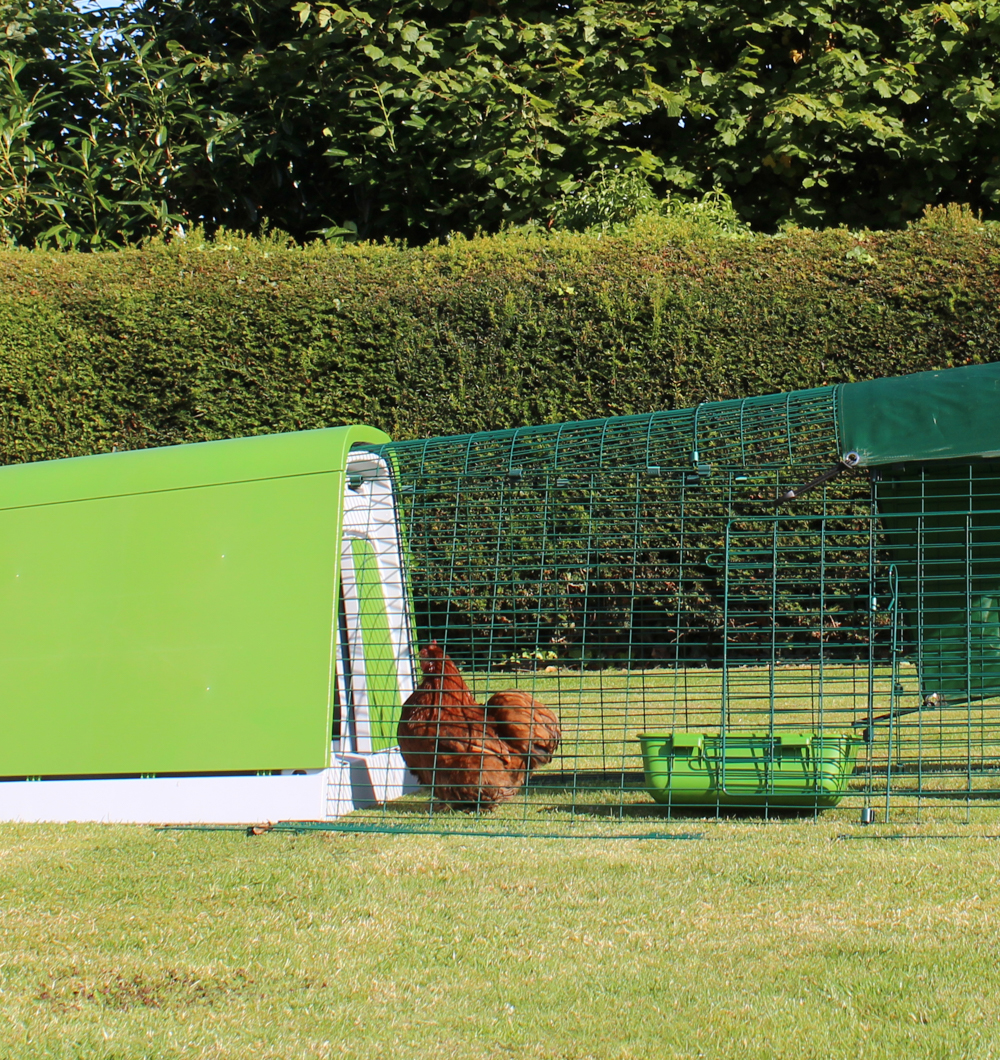
The twin wall insulation will keep your chickens cool under the Californian sun.
Eglu Go Chicken Coop
Considering keeping a smaller flock due to local California laws? The Eglu Go Chicken Coop is the perfect home for flocks of up to four and has also been designed with twin-wall insulation. You can even add Eglu Go Wheels - ideal for moving your coop to a new, elevated patch of your backyard when rainy weather and mud arrive.
Ambassadors
Speak to an Omlet chicken keeper in California
Omlet ambassadors are on hand to help you make the right coop choice for your chickens, by phone, email, video call, or in person. Find an Eglu owner in California on the map.
Your flock and California weather
California has mostly mild weather year-round, but here’s what you can expect season by season.
Spring
Spring is lovely in California, and mostly mild throughout the state. For chickens, that means it’s a great time to be out in the backyard or garden, scratching for bugs like grubs and earthworms. Chickens also love sunbathing and taking dirt baths and can put on quite a display. You can easily make your own dirt bath by using a half barrel or kiddie pool filled with varying amounts of soil, sand, ash, lime and/or diatomaceous earth to help your chickens get rid of pesky parasites. Not only is a good dirt bath entertaining for your chickens (and for you!), it’s an important chicken self-care ritual that keeps them healthy and happy. It’s not uncommon to see a pile-up of chickens all having a blast in the dirt bath together. Think of it as a social activity as well!
There may be snow on the ground in some regions, but most of the state will see fair weather with a few rain showers. Be sure to have a predator-resistant chicken coop and run, since this is the time of year when predators (foxes, for example) will be trying to feed their young and even teach them to hunt, even in suburban and city neighborhoods. For wet weather, consider covering your run with a tarp that protects your hens from rain but still lets in the light. A wet, muddy run can pose health risks for your chickens, so try to position your coop and run on an elevated part of your backyard so the water won’t flood the run.
Summer
Summer in California can see temperatures that hit the 100s, so it’s important to keep your flock cool and hydrated. Offer water with electrolytes and healthy treats that hydrate them, such as watermelon. You can even offer frozen fruits and veggies in chicken treat dispensers as a source of entertainment for them. As far as coops go, be sure you get a ventilated coop that keeps chickens insulated from extreme weather. Place your coop in an area that is fully shaded to keep it as cool as possible. Some chicken keepers use misters or fans, but you can also keep a kiddie pool with water so that your chickens can stand in it and cool off that way. It also helps to hose down the ground in your run to keep it cool. Again, shade is going to be the most critical element to keep your coop and run cool in the summertime. Consider a portable coop that you can move into the shade as needed. Don’t forget to clean your coop often when it’s hot since heat can harbor bacteria and attract flies. If you notice any weak or lethargic behavior, try to cool your chicken down as soon as possible (a lukewarm to cool soak can help) and call your vet for guidance.
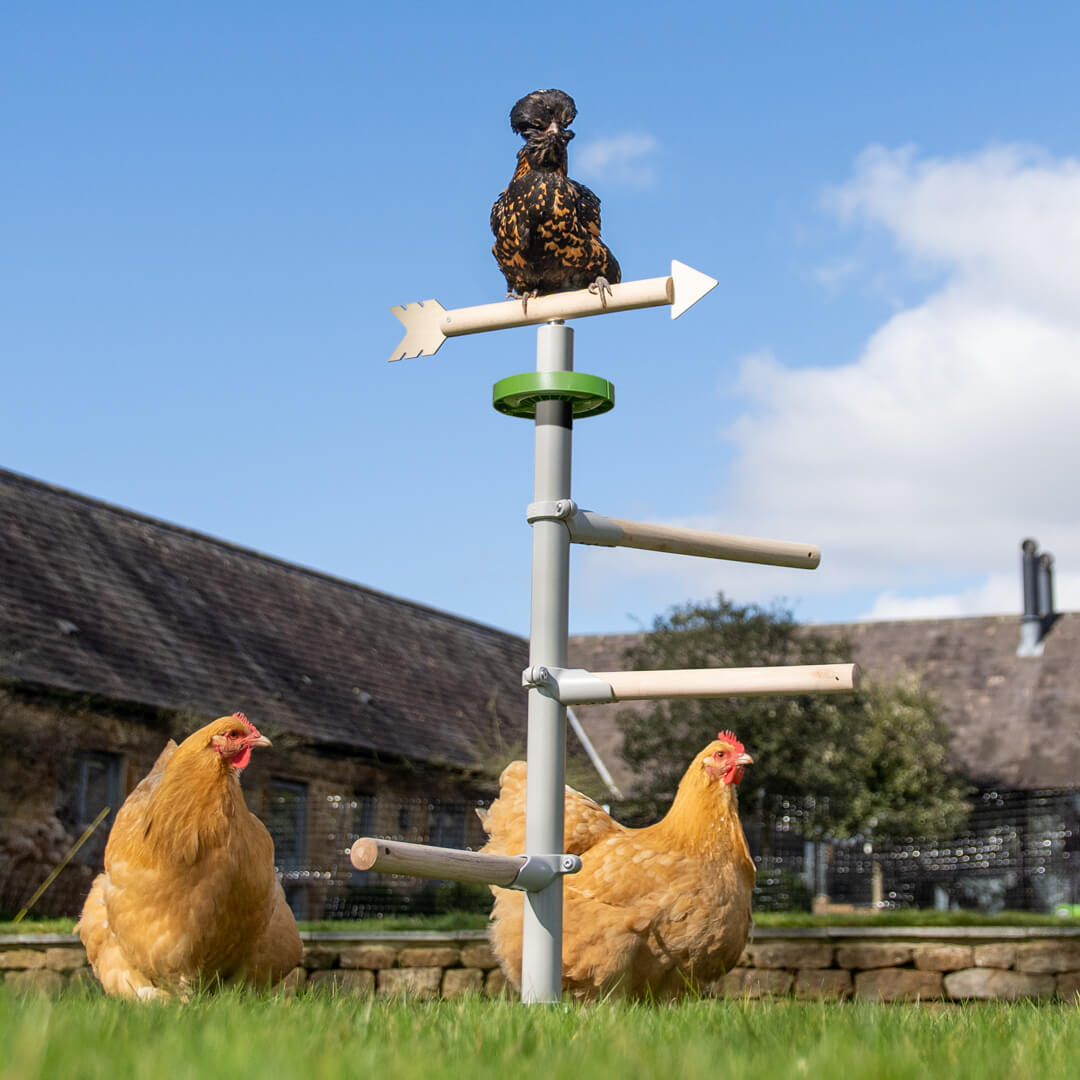
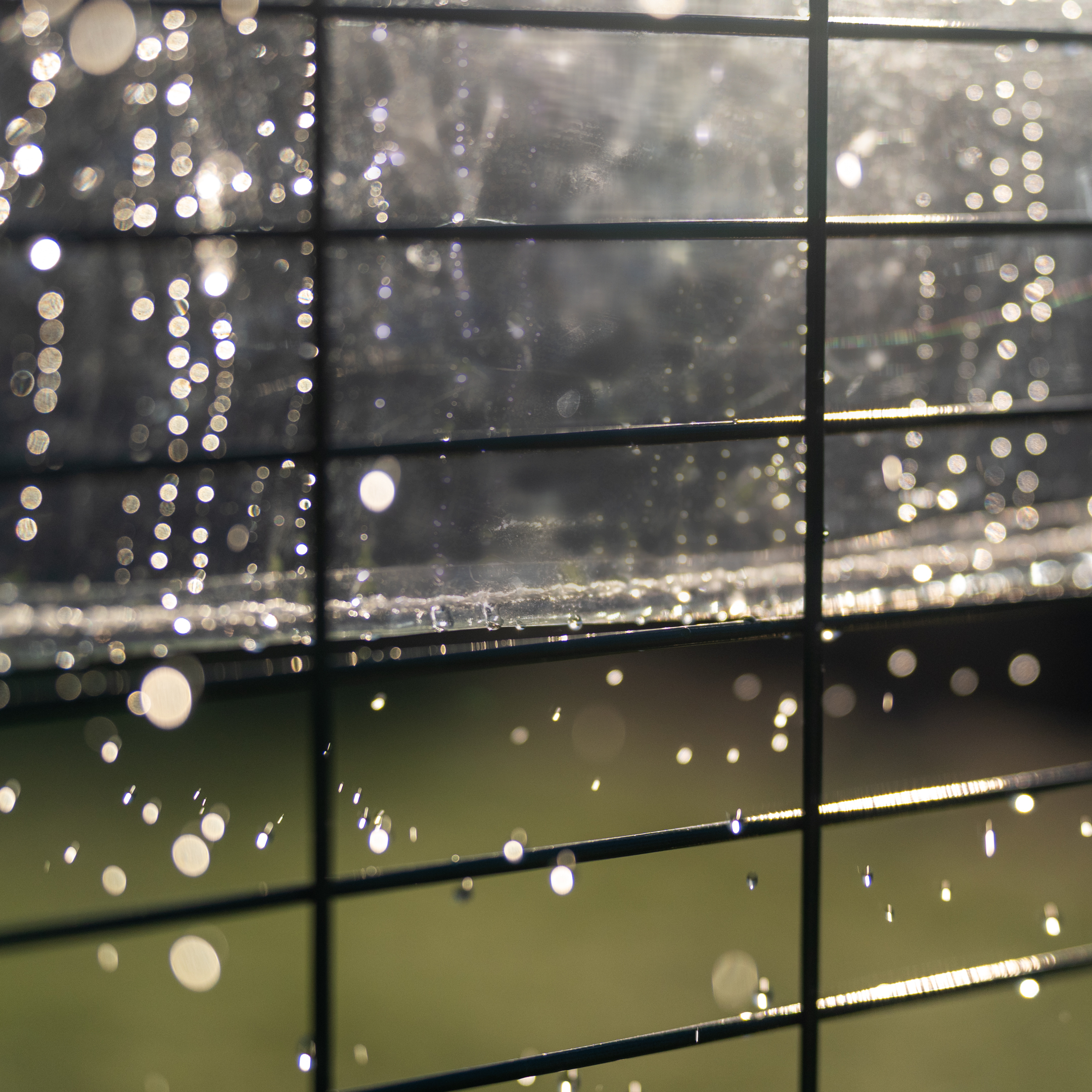
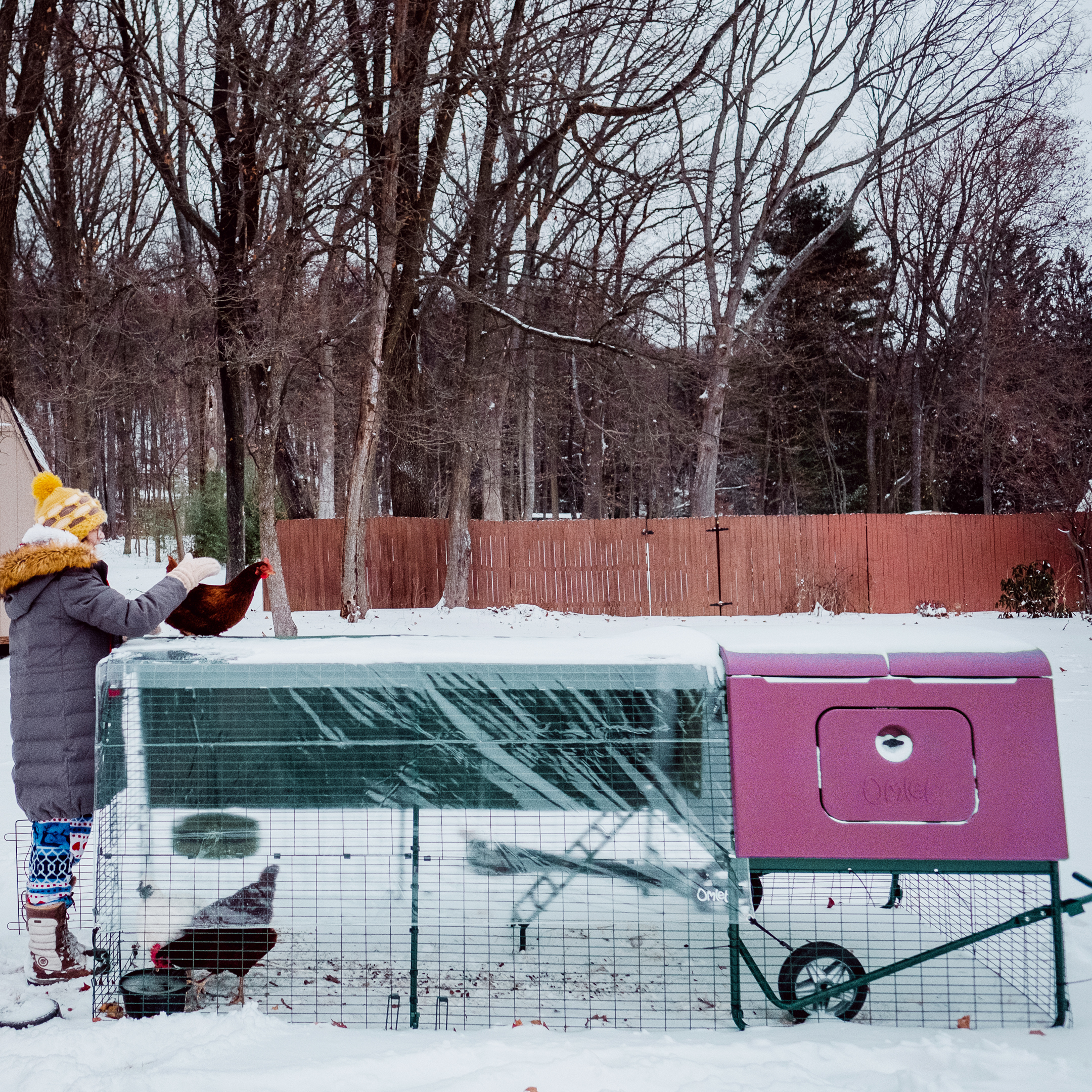
Fall
Fall is wonderful in California. In most parts of the state, temperatures range from the 50s to the 70s. There can still be some warm temperatures as the heat of summer sticks around, but most of the season is quite pleasant. Once the leaves start to hit the ground and pile up, let your chickens forage through them and look for tasty bugs.
Fall is a time of transition for many chickens, so it’s a good idea to learn what to expect and how to prepare your flock for fall. One change you can expect is that your chickens may start to molt in the fall, losing almost all of their feathers to regrow new ones. Egg production also starts to slow or stop in the fall, just ahead of winter. Don’t worry if you experience these things, but it can be alarming to have a few ragged chickens running around that stop laying eggs. To help your chickens get the nutrition they need during molting season, you can supplement your flock’s diet with treats high in protein.
As the days get shorter and the sun sets earlier, you might want to consider a coop Autodoor that works with the daylight, or can be set to a timer to keep your hens safe at night. That way, even if you haven’t made it home from work in the evening, your chickens can still put themselves to bed. The Omlet Autodoor offers a light add-on, so you can provide a visual aid for your hens to find their way up to the coop at night.
Winter
In some parts of California, winter can be very cold and even get snow. It’s critical to be prepared for tough winters if you live in one of these regions, such as the mountains. You’ll want a predator-resistant coop and run with skirting around the outside, as predators often get desperate and bold in winter months. Your coop should be well-insulated to maintain a comfortable temperature inside, even when temperatures reach freezing outside. The Omlet Eglu Cube, for example, has double-walled insulation to keep your chickens warm in winter. Monitor your chickens and their behavior to determine if your flock are cold.
In addition to a sturdy, weather-proof coop, you can consider getting a weather-proof cover that helps add extra insulation to your coop and run. The Omlet Eglu Cube is sturdy and insulated yet ventilated to allow fresh air to pass through the coop. Ventilation is key to avoid ammonia from building up from their waste and prevent health issues in your flock. To keep your chickens’ feet dry and warm, add extra bedding to the bottom of your run, or consider adding chicken perches to keep them off cold, wet ground. Do what you can to keep the ground dry and warm. In the evening, before your chickens head to roost for the night, you can offer a bit of scratch, corn, or oatmeal to give them a little added temperature boost on chilly nights.
Best chicken breeds for California weather
Most chicken breeds do just fine in all parts of California. If you live in an area with high temperatures in summer, be sure to select heat-hardy breeds. If you live in a high-altitude climate where there’s snow in winter, be sure to choose cold-hardy breeds. And if you’re lucky enough to live in California, you know just how lucky we are to have such moderate weather year-round. Here are some of our favorite breeds that will thrive in the Golden State:
Where can I buy chickens in California?
Most people buy chickens from hatcheries and have them shipped to California, although most of the major hatcheries are located across the country. If shipping live chicks makes you nervous, look locally. There are often farms or backyard chicken keepers who have chickens on hand. Just be sure to do your research to make sure you’re supporting a humane breeder that will provide you with healthy chickens free of diseases and parasites.
Often, local farm supply and feed stores will offer “chick days”, especially in the spring months. Search your local community listings or feed stores for chick days and chicken sales. Note that chicks are often sold as either “straight run” or “sexed”. Straight run means they are not sexed and you will likely end up with some roosters. But even sexed chickens can be sexed incorrectly, so have a backup plan if you do end up with an accidental rooster or two and they aren’t allowed where you live.
If you purchase chicks, be sure to do your research and have a brooder with a heat source set up inside. Chicks also have different nutritional needs than hens. When your chicks reach about 6-8 weeks of age, depending on your climate, they can usually be moved outside to live in a coop. Please note that chicks should not be moved into their Omlet chicken coop until 12 weeks old. If introducing chicks to an existing flock, be sure to integrate slowly and with supervision. The Eglu Go is a great starter coop for chicks, or when you want to do a slow introduction.
Common chicken predators in California
You might be thinking, “I live in a city backyard. We don’t have predators here!” Think again. There are tons of predators within city and suburban limits that could be a threat to your flock. Daytime predators include:
- Neighbors’ dogs and cats
- Coyotes
- Foxes
- Hawks and other aerial predators
Nocturnal predators include:
- Raccoons
- Possums
- Bobcats
- Mountain lions
- Owls
The best defense against ground predators is skirting around the exterior of your run. Some people also wrap their runs with hardware cloth to prevent rodents from getting in and eating the chicken food.
The Omlet chicken run includes heavy-duty skirting that keeps your chickens safe from digging predators in the run. You’ll also want a sturdy chicken coop with secure doors to lock up your chickens up every night. The Omlet Autodoor can help keep them safe while offering convenience for you. Remember, your best defense against predators is a predator-resistant chicken coop and run.
How many chickens can I keep in California?
The number of chickens you can keep in California depends on your city, town, or county chicken laws and ordinances. Every city is different, and you might be surprised at how many chickens you can keep in your city backyard.
Do I need planning permission for my California chicken coop?
It depends on what city or town you live in. Do your research and run a quick internet search and you’ll usually find a local government page that lists exactly how many chickens you can have, whether or not you can have roosters, and zoning ordinances (such as how many feet from neighboring dwellings your chicken coop must be). There may be laws around how big your chicken coop or structure must be, so if you want to be on the safe side, it makes sense to consider a compact coop that still gives your chickens plenty of space. The Omlet Eglu Cube is a great choice for city backyard chicken keepers and also has the option to add wheels and move it like a chicken tractor, so you can abide by all of the zoning requirements in your city.
One thing to note is that chickens, even hens, can make noise, usually in the form of an “egg song”. Think of it as an announcement to the world of her accomplishment, and it usually happens almost every day for every hen. That said, hens aren’t nearly as noisy as roosters.
Caring for your flock with Omlet
Chicken keeping is easy with Omlet’s chicken coops and accessories. With an intuitive design, easy cleaning features, and loved by chicken keepers across the globe, Omlet coops are a great choice for any chicken owner. Omlet offers a variety of runs, including walk-in runs and standard runs that you can customize to any length to house your flock safely and securely. With predator-resistant features, the runs are designed to give you peace of mind and keep your flock happy and comfortable in any weather. You can even add chicken peck toys or chicken perches to enrich the lives of your flock and keep them happy.
Local Pictures
Comments Leave a comment
There are no comments just yet